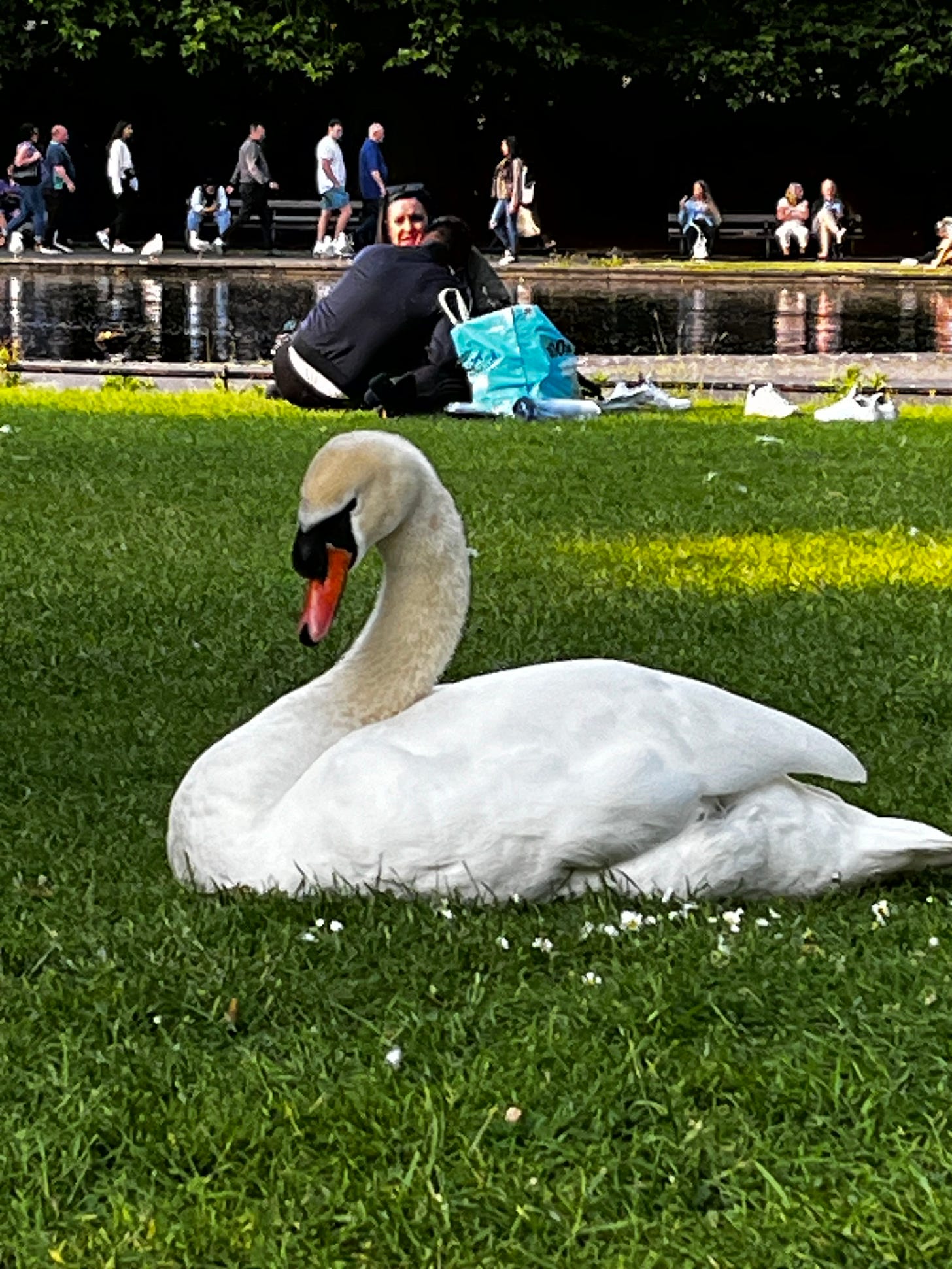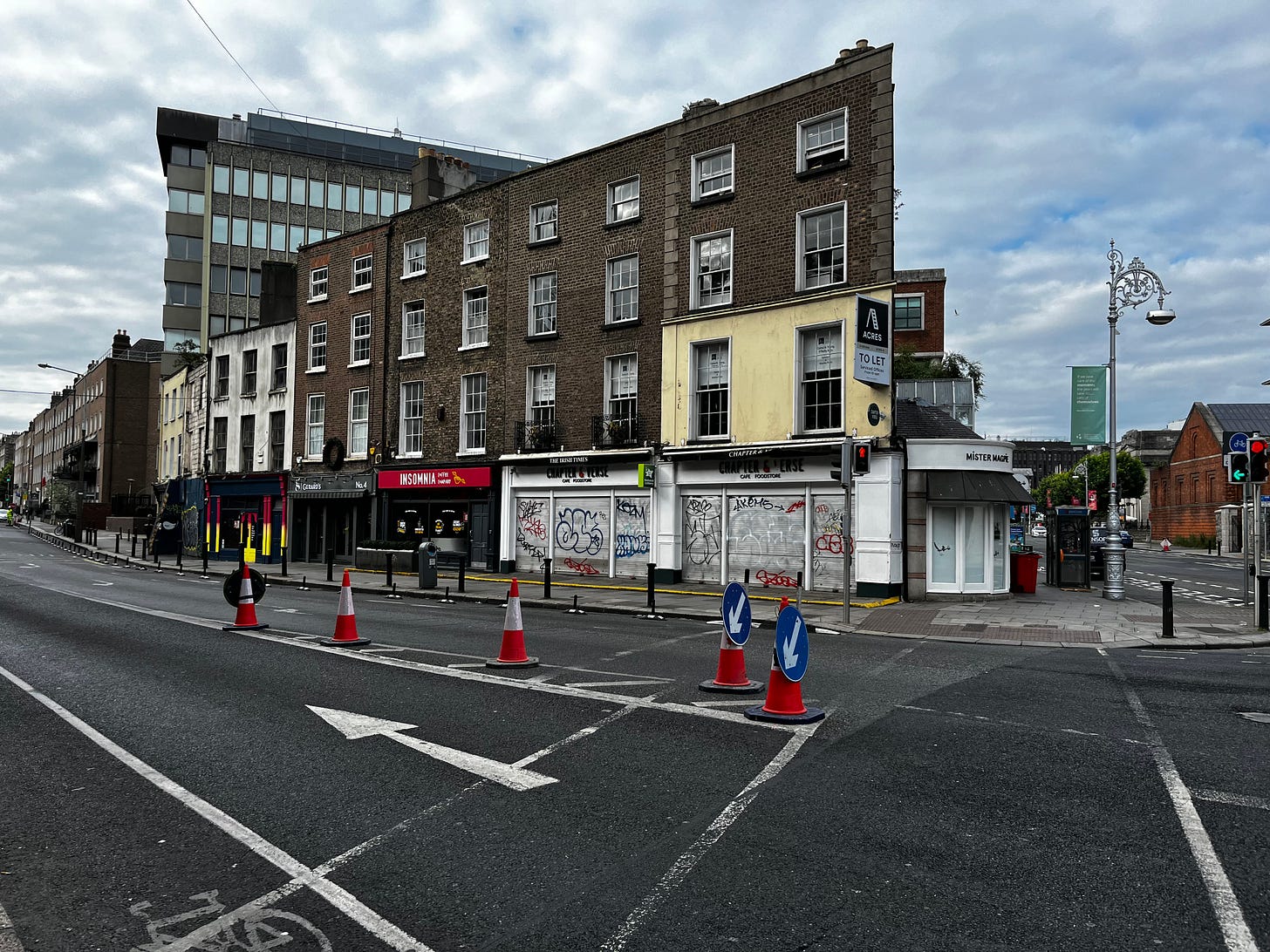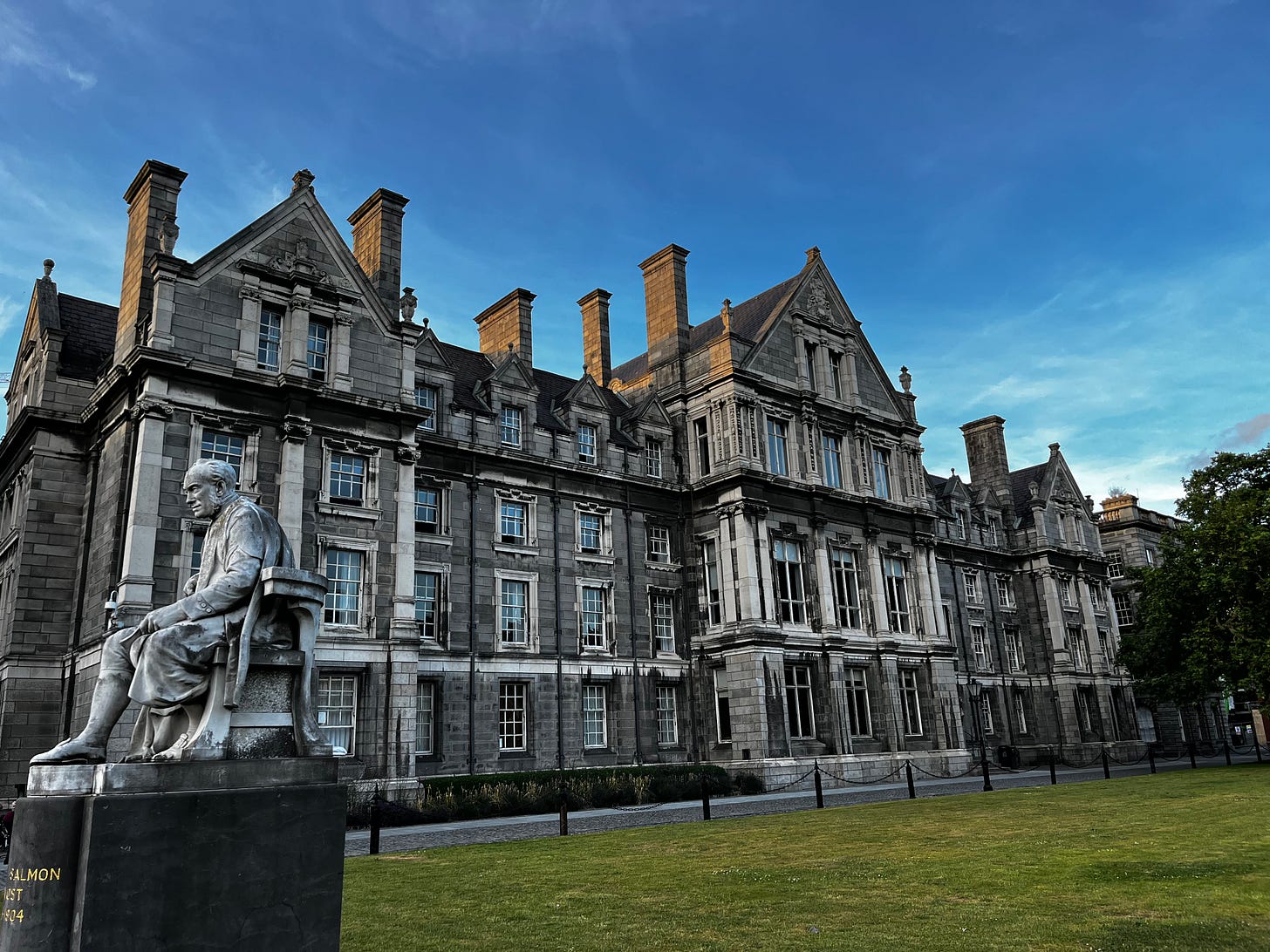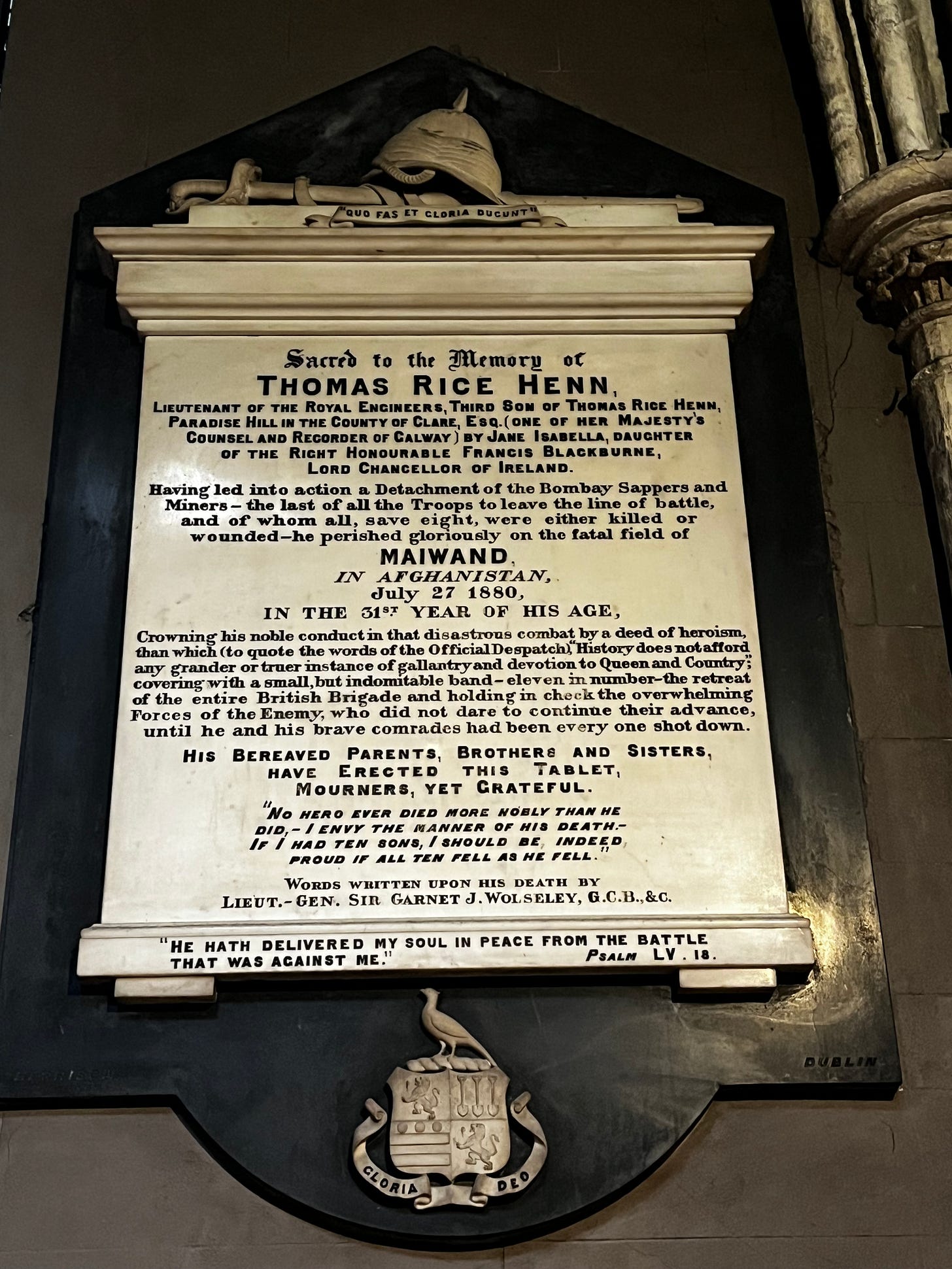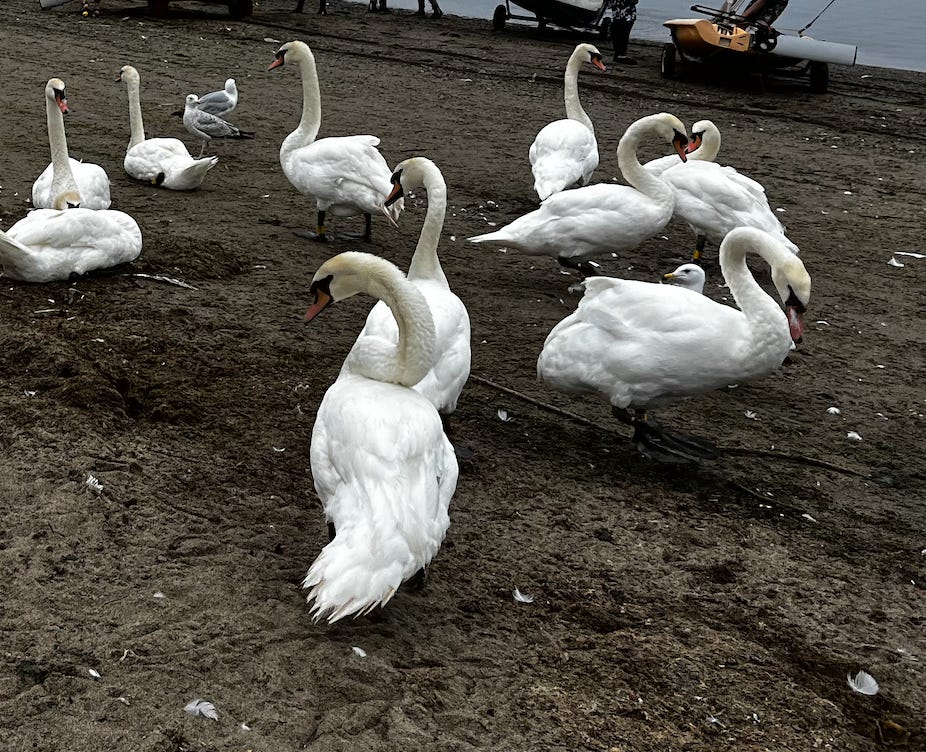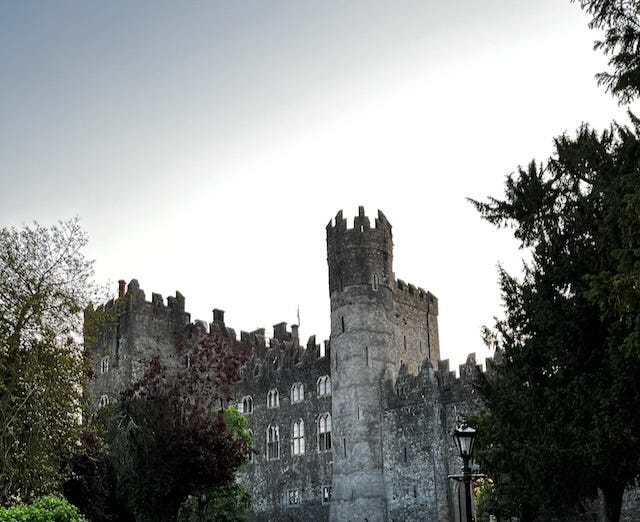It was not until 2019 that our children were old enough that we felt traveling to Europe would be enjoyable. We imagined finishing their high school years with annual trips exploring various parts of our mother continent. Italy was on-deck and booked for 2020, and then the world stopped. So 2023 marks our return to international travel, this year to Ireland.
Day 1:
On our previous trip, I had questioned whether business class, with the little seat that makes into a sort-of bed, was worth the expense. My big idea then was to take a night flight, sleep on the way, and “wake up” in the early afternoon in Europe. Since we go to bed early in the States, we’d go to bed late in Europe and make a smooth transition. It didn’t work out that way in 2019, as I was able to get very little sleep on the flight.
We tried this schedule again this year, but my wife advised me to try an eye mask. I had never used one before, and weirdly this was one of my - no pun intended - blind spots where my usual openness to new ideas failed me, as I previously refused to use one. My wife was right. With an eye mask and earplugs, I slept well and woke up reasonably energetic in Ireland.
Airports - Houston (IAH) is very nice. Dulles for our connection was kind of dingy with low ceilings. Dublin is also very nice. In both American airports business class enabled us to use the lounges, which was fun to enter with our large, highly verbal family. We get a few stares in invading the inner sanctum of the relatively sterile upper middle class, for whom the lounges are a perk for endless work and travel as they fulfill their mission statements and corporate synergies. You don’t see many children in the lounges. In general, I enjoy the attention we get in airports as we proceed through the various checkpoints. I get a lot of street cred for having four daughters (people perceive girls as requiring more effort, but I wouldn’t know the difference), as we introduce them one by one with their passports. We made actual people, and that matters more than the perks of the corporate janissaries. I have friends with larger families (in our closest friend circles our family size is merely typical), and I would enjoy seeing the reactions to my close friend with eight children in a similar situation.
In Ireland, we were transferred to our rental by a Serbian driver named Darko, maybe ten years my senior. He had made his way to Ireland 19 years ago, he said to clear his head after “the wars.” If I hadn’t been so jet-lagged, I would have apologized on behalf of the United States for our bombing of a fellow Christian nation to distract from Bill Clinton’s woman problems in the mid-90s.
Mostly, I was following his tips for left-side driving. He informed me that right-side driving was an artifact of Imperial France, as Napoleon was left-handed and made his cavalry hold their swords in their left hand, reins in the right. This also made Napoleon’s cavalry more effective, much like left-handed boxers are unexpectedly dangerous. The British had done the opposite, holding their swords in the dominant right hand, making driving on the right side of the car / left side of the road more natural. How Americans ended up driving on the right side of the road remained unexplained. He assured me that the transition was not so difficult when we rent a car in a few days. And helpfully, he also explained, if I smoked (and many more people smoke here), that disposing of ashes is much easier on the right side of the car, as one can smoke with one’s dominant hand.
We made our way to our rental just across from St. Stephen’s Green. The highlight of Day One was the birds. We saw a swan family several times in the Green, and in the tourist district, we met Daniel the bird man, who would give you oats to feed pigeons that would perch themselves on your hand, shoulder, and head, and then solicit donations to a likely fictitious charity between cigarettes. It was worth ten euros worth of entertainment regardless.
Day 2:
Darko had told us how good the food would be here, as Ireland’s odd climate enables cows to eat green grass 365 days per year. It almost never freezes, and it’s never hot, sort of like a European Argentina. High-quality grass-fed beef seems rather cheap compared to the States, and I’m making the most of it. Our evening restaurant featured “beef dripping chips.” Distant memories of McDonald’s fries from my early childhood - before a zealot ruined them - are activated. No volatile, off smells, and a background taste of a good ribeye in every bite. They’ve taken so much from us with the seed oils.
We’ll see if it lasts, but I am finding I am less hungry here. There are many stories of spontaneous weight loss by Americans visiting Europe, perhaps due to cleaner agricultural regulations.
Sleep is a challenge in the rental. The irony of “escaping the heat” of Texas is that the places we go tend to not have air conditioning, but we are here during the hottest part of the year (is the solution perhaps to fly to a true winter in the southern hemisphere?). With windows open, the 60-degree air outside doesn’t quite cool the house as I would like, leading to cycles of sweating and sleeping. But outside during the day, it’s very lovely.
Dublin is a bit dirty. I wonder who’s responsible for the omnipresent graffiti and litter. There’s not that much non-EU immigration, yet, as far as I can tell. Are there roving native Irish gangs marking their territory with spray paint? There are certainly native homeless begging in various places, but not in the scary mentally-ill drug-addicted way in America. The begging is quiet, orderly, and the beggars are neatly dressed.
The city is, despite this, pleasant and very relaxed. Many retail businesses close on the weekend and early on weekdays. The Irish have decided that killing themselves for every nickel is not a way to live. I could get used to this. And I respect that the Irish got rich - the second highest income in Europe now - by offering tax shelters, as a tour guide pointed out the various fake “headquarters” of Meta, Twitter, Airbnb, and Google. An Irish company holds the intellectual property, and licenses it to the US operating company, draining off most of the taxable profit. A brilliant scheme, and it serves the rest of us by putting downward pressure on corporate tax rates worldwide.
Day Two featured a tour of Trinity College, including the Book of Kells, followed by a cheesy Viking duck boat tour.
Day 3:
This was our last full day in Dublin, and today’s main activity was a tour of the Anglican St. Patrick’s Cathedral. For Sunday church, we stayed for the evensong. We were locked in a pew with a door, and the group was instructed rather sternly by a guy in a robe holding a mace to silence our cell phones and take no video during the service. Mace guy would subsequently symbolically tap his mace at each speaker before they began their reading or sermon, and accompany the gathering of the offering. I want to imagine this as a medieval tradition where anyone who doesn't faithfully preach or read the word gets their head smashed by mace guy.
The service consisted of psalmody, scripture readings, and recitation of the Apostle’s Creed, and in all probably ten times more Biblical content than a typical American evangelical service. The short sermon (< 10 minutes) was on the woman who sought out Christ for her hemorrhaging, and was non-objectionable. All of the speakers were male priests who very much looked and sounded the part of Anglo-Irish clerics. To hear Scripture and the traditional Celtic benediction “the Lord bless you and keep you and make his countenance shine upon you…” in the Irish brogue was a treat. This is my second service to attend at an Anglican Cathedral (the other being a service in honor of St. James at St. Paul’s in London) and it seems they are maintaining aesthetics nicely. Do they perhaps confine the revolting woke stuff to less posh congregations?
The cathedral was covered with memorials for the dead, including Jonathan Swift, who was dean of the Cathedral, and one for the Boyle family, a younger son being Robert Boyle, of chemistry fame. Lesser-known names, forgotten to history, but evidently well known in their own times, reminded me that in 100 years, few will remember most of us, even if our families can afford a memorial in an ancient cathedral. Better to focus on a legacy while living, for the future will quickly forget anything about us.
This plaque struck me, a young man cut down in Afghanistan, a country whose singular claim to fame may be to have marked the peak of hubris for the British, Soviet, and American empires:
It’s interesting that historically, the moment an empire thinks it can civilize or reform Afghanistan is the moment it has exited realist politics, begins believing its own most triumphalist propaganda, and will soon recede.
Tomorrow I must drive, so I am visualizing turns and shifting a manual transmission with my left hand.
Day 4:
This morning I picked up our rental, a seven-passenger VW minivan (the Sharan) with a manual transmission and diesel engine. Driving on the left side of the road on the right side of the car proved easier than I expected. The car is extremely fuel efficient. We drove half of the day and only used 1/16 or so of its tank. I am proud of our family for managing to pack in four international standard-size checked suitcases*, which seemed oppressive at the time but was absolutely all this car would hold with six passengers. Driving in Ireland, outside of the interstates, is often on very narrow roads with stone walls on either side with no shoulder. The speed limits are a joke, or perhaps they are self-limiting in a Darwinian sense, as a rural road marked as 80 km/h would be very dangerous at that speed.
*Recommendation: we have been buying TravelPro suitcases for some years now. They take a ton of abuse better than cheaper brands, as luggage tends to, but they’re not so expensive such that I regret the abuse.
On the way to our next destination, we stopped in Bray for brunch near their swan sanctuary, feeding them our leftover granola.
We then proceeded to the Powerscourt waterfall and estate to tour the gardens.
We took a scenic route to our next destination through the Wicklow Mountains. The contrast of landscapes on this island is pretty amazing, given we drove 45 minutes from lush coastal areas to mountains without trees. I noticed a similar geography in Alaska, that the treeline seems to come at lower elevations at higher latitudes. I’m not sure if that’s due to the soil or some combination of lower solar radiation and altitude. These are low mountains, with a typical elevation between 2000 and 3000 feet.
Our destination for the day was a castle resort where we will stay for the next two nights. One interesting feature of addresses here is that zip codes are alphanumeric, having embedded within them information sufficient to identify the exact address. Called “Eirecodes,” they can be entered directly into Google Maps for directions to any address
Day 5:
Today’s activity included a falconry session with a local bird enthusiast, an older gentleman named Bernard. He brought two owls imprinted on people who could be held, cuddled, and kissed:
The other birds of prey were not so cuddly, and had a more transactional relationship with humans, expecting a currency of raw meat for good behavior. The falcon, though small, was the most dangerous bird, having a razor-sharp wingtip that can slice a face and a beak that can remove an eye.
Towards the end of our time, somehow Bernard and I’s conversation turned to Irish politics. As a descendant of ancient Irish Catholics, he spoke of the desire of the Irish Republic for a unified Ireland. He described Northern Ireland as run by “bigots” who engaged in segregation and discrimination against the Catholics, and how he almost never goes there, and if forced to by circumstances, he doesn’t even stop and talk to people. He compared the struggle of the Catholics to civil rights in America, and I think he said something like, “These were the same people who started the Ku Klux Klan.” That’s, uh, technically correct, but pretty unfair. I didn’t mention we were Presbyterians.
The Protestant Scots-Irish are fierce and merciless, always have been. I’m reading Fehrenbock’s realist history Lone Star right now (review forthcoming), and he makes an argument that Texas was largely a Scots-Irish republic. He ascribes their aggression not so much to a conscious ethnic pride (indeed, the group is today largely unaware of their own ancestry and history), but rather a determination to completely destroy all enemies, whoever they may be. This lack of awareness of their own identity and love of fighting makes them the historical backbone of the US military, and in this ignorance, they are largely used by the regime to fight the wars of the American empire. With military recruitment struggling and their great chieftain Trump under regime sanction, perhaps they are finally getting a clue.
It was interesting to hear the rawness of Bernard’s resentment, of a religious conflict that is hundreds of years old, but still fresh. The Catholics oppressed the Protestants in the early Reformation, who then sought legal protections against majority rule by Catholics in Ireland. That’s always a nasty business.
Given analyses have revealed that the English, Scots, and Irish are all indistinguishable genetically, it makes one pessimistic that divides that go beyond religion can ever be healed this side of eternity. The “partition” of Ireland, as the English call Irish independence, was probably the best that can be accomplished. Apparently, they have managed a workable secession, in that people, including tourists, can travel and do business freely across the border while living under different governments. It’s a model to be studied if American blue-red divides continue to polarize.
Tomorrow we head to western Ireland and County Kerry, the most visited part of the countryside.



